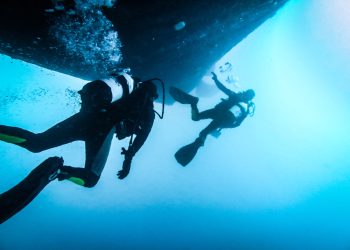Gard Club informs about vessels calling at ports in Eastern Asia and Russia Far East between May and October that should be inspected and certified free from Flighted Spongy Moth Complex prior to departure.
According to Gard, the Flighted Spongy Moth Complex (FSMC) flight season, when females lay their eggs and there is a risk of egg mass depositions onboard vessels, extends from May to October. However, the specified risk period (SRP) for each port varies depending on the port’s exact location and its climatic conditions. Because the moth’s egg masses can tolerate extremes in temperature and moisture, larvae can hatch months, if not years, after an egg mass was attached to a vessel.
If this occurs when the vessel is in a country where the FSMC is not native, but the climatic conditions can sustain FSMC lifecycles, it has the potential to seriously affect the country’s agricultural and forest resources.
As a result, FSMC exclusion efforts are considered a priority by many local port authorities.
Regulating countries
In addition, the following should be noted:
- Canada and the US work together to manage FSMC risks at origin and both countries have aligned their policies on FSMC regulated areas and SRPs with the most recent recommendations by NAPPO. Vessels that have called on a port in a regulated area during the SRP over the last 24 months must arrive in North American ports free of FSMC and should have obtained pre-departure certification.
- Chile’s policy on FSMC regulated areas and SRPs is aligned with that of NAPPO, and hence Canada and the US. The same goes for the pre-departure certification requirements. However, unlike Canada and the US, Chile does not provide its own list of recognized overseas inspection and certification bodies but refers to the local phytosanitary authority of the country in question.
- Argentina’s policy on FSMC regulated areas and SRPs largely mirrors that of NAPPO, and hence Canada, the US and Chile. However, Argentina additionally defines its regulated ports in Eastern Asia and Russia Far East as “all ports located between 20°and 60° N latitude”.
- New Zealand’s policy on flighted spongy moth complex regulated areas and SRPs is aligned with that of NAPPO, and hence Canada, the US, and Chile. However, unlike these countries, only vessels that in the past 12 months were in one of the regulated ports during the SRP are required to present a valid pre-departure certificate.
- Australia targets vessels that have visited a port in Russia Far East between 40ºN, 60ºN and west of 147ºE, anytime between 1 July and 30 September in the previous two calendar years and have no certification requirements like the other regulating countries.

Furthermore, vessels entering a regulating country may be inspected at any time of the year to verify that they are free from FSMC. However, as the potential for larvae to hatch from egg masses attached to a vessel in port, and spread, depends on the local climatic conditions at a specific port, each of the regulating countries may specify certain periods of the year with heightened surveillance and more systematic inspection for FSMC.
If FSMC egg masses are detected during port inspection, the requirements imposed on the vessel depend on each country’s regulation, taking into account climatic conditions at the time of entry as well as the degree of FSMC infestation, and the stage of development of the egg masses detected.
Gard recommends the following in order to reduce the vessel’s risk of FSMC infestation:
- Carry out a thorough visual inspection of all accessible areas of the vessel’s superstructure, decks, holds, cargo and cargo gear and use binoculars to inspect unreachable areas.
- Scrape off any egg masses found and destroy them in alcohol, boiling water or by incineration.
- Record details of the inspections undertaken and the removal and disposal of FSMC egg masses in the vessel’s deck log-book.






























































